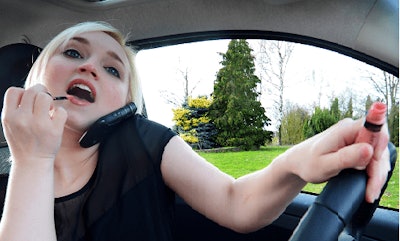
By Jeff Sanford
Toronto, Ontario –- April 13, 2018 –- In today’s Friday Fun: The remarkable rise in insurance costs for drivers caught texting, Arctic collision repair and the world’s largest auto insurance scam.
The lead of a Long Island newspaper story is amusing; “This car needed a repair so badly it couldn’t wait any longer,” it reads. Not so amusing is the report from local police who attended a scene where a woman driving a 2016 Accra lost control and crashed into BIG n’ Little Auto Body around 2:00 am Wednesday. The woman was taken to hospital with minor injuries. A building inspector will investigate possible structural damage to the shop in coming days. bitingly/2Ht0b21
A simple spelling error left a Toronto-area woman unable to cash an $8,000 cheque from her insurance company that had been sent to compensate for a car that had been trashed in a collision. According to CTV News, “Carolina Ayala’s 2011 Nissan Versa was deemed a write-off by her insurance company after it was involved in an accident in January… Five years ago, she owed Nissan Canada Finance $21,000 for the vehicle. An amount she paid in full. But when a cheque for the car’s current value arrived from the insurance company after the accident, it was made out to Ayala and Nissan Canada Finance. [But] Ayala could not cash the cheque.” Her credit report indicated that she had never paid for the car, even though she had proof that she did. Equinox and Trans Union would not immediately acknowledge the mistake according to the report. But when Nissan Canada checked her files, they found Ayala’s name had been spelled incorrectly. In a letter to Ayala, the automaker acknowledged the “full and final release for (the) specified vehicle.” Ayala said she was shocked that a spelling error could cause a prolonged financial headache. “It’s something so simple,” Ayala said. So is spelling your name.bit.ly/2ILLnLn
A U.S.-based online insurance portal, The Zebra, released an interesting report this week. The data originates from the U.S., but the trend likely applies to Canada as well. According to the report, “… for the first time since the advent of cell phones, car insurance companies are penalizing drivers who text or use their cell phones while driving. In fact, the average insurance penalty is up nearly 8,000 percent since 2011…” A driver’s insurance rate is affected, of course, by an individual’s driving record. What the study finds is that the cost of an auto insurance policy has skyrocketed for someone with a distracted driving ticket over the past several years. The study finds that a ticket for distracted driving raised a driver’s car insurance rates by 0.2 percent in 2011, less than $3 per year. According to the report, “Now, the same violation will raise rates 16 percent, or about $226 – a penalty increase of about 7,900 percent.” Which might not be a bad thing if you’re distracted annoyed with people who text while driving. bit.ly/2Hk1t1I
Too few Canadians took notice of an impressive bit of auto age history last year when this country got around to extending the road network to every ocean that abuts this nation. For a long time Canadian drivers had route to the U.S. if they wanted to traverse the country from east to west. There was no highway going around the top of Lake Superior. You had to go the states to get from the Atlantic to the Pacific Ocean. That changed in 1948 when the Trans Canada highway was built. But it was only in 2017 that a year-round, full-on asphalt highway connected southern Canada to the Arctic Ocean. According to a CBC report from this past winter, “There are over a million kilometres of road in Canada, but few have gone as far as our third coast — the Arctic Ocean… After four years of construction in brutally harsh conditions, the last 137 kilometres connecting Inuvik to Tuktoyaktuk, on the shores of the Beaufort Sea, finally stitch Canada’s [three] coasts together.” It wasn’t long after the new highway was opened that the first collision took place on the highway. The crash involved Tuktoyaktuk’s Mayor Merven Gruben. According to a news report, Gruben, was driving along the route when he came across a van stuck in the snow. According to the story, “Gruben skidded to a stop, got out of his vehicle and chatted with the other driver. However, he then realized his SUV was stuck, too… He was about to grab a shovel out of the back of his car when, ‘out of nowhere’ a pickup going pretty fast smashed into the back of [the] SUV.” Gruben posted a warning on Facebook, “I’m not a rookie winter driver but, with this new highway we are all rookies… Before leaving, check weather and highway conditions.” The most northerly collision repair centre found in a quick online search could be Northwind Collision in Inuvik. Anyone know one more northerly than that? bit.ly/2GY1HYU
Rolling Stone magazine this week published an excerpt from a forthcoming book on Trump and his connections to Russia. The book will be released May 8, and will surely make some headlines as it details allegations that Trump ended up laundering money for the Russian mafia. One interesting allegation in the RS article: Apparently there is a distant connection between Trump and what some consider the biggest auto insurance fraud scam of all time. The book chapter excerpted in the magazine details the role of Michael Cohen, Trump’s long-time lawyer and personal “pit bull.” Cohen’s office was, of course, raided this past week. According to the story Cohen joined the Trump Organization in 2006. He grew up on Long Island, the son of a physician and spent a childhood around organized crime, specifically the Russian ‘Mafiya.’ Cohen’s uncle, a wealthy Brooklyn doctor, owned the El Caribe Country Club, a Brooklyn event space that was a well-known hangout for Russian gangsters. In the 1990s an informal group of federal and local law enforcement agents investigating the Russian Mafiya in New York called themselves “Red Star.” It was well known among the members of Red Star that Cohen’s father-in-law was funneling money into Trump ventures. Cohen himself helped money launderers purchase apartments in a development in Sunny Isles Beach, a seaside Florida town north of Miami, according to the article. Many Russians, including executives from the massive state-owned oil and gas firm, Gazprom, owned units in Trump’s Sunny Isles towers. (Gazprom is controlled by Putin.) According to a former prosecutor who tracked the flows of Russian criminal money into Trump’s properties, “Trump’s genius – or evil genius – was, instead of Russian criminal money being passive, incidental income, it became a central part of his business plan. It’s not called ‘Little Moscow’ for nothing. The street signs are in Russian. But his towers there were built specifically for the Russian middle-class criminal.” Many Russians were forced to do whatever they could to survive the collapse of the economy in the late 1990s, so it’s unfair to consider every Russian with a little money in a North American condo a criminal. But the story does mention Michael Barukhin who lived in one of the condos and ended up pulling off one of the largest auto insurance scams in history. According to a news story of the scam, “The fraud scheme involved 10 licensed medical doctors, three personal injury lawyers, thousands of patients, clinics in the Bronx, Brooklyn and Queens, and 105 legal corporate entities in an alleged attempt to bill more than $275 million in fraudulent charges to no-fault auto insurers.” bit.ly/2GUiUCV





















